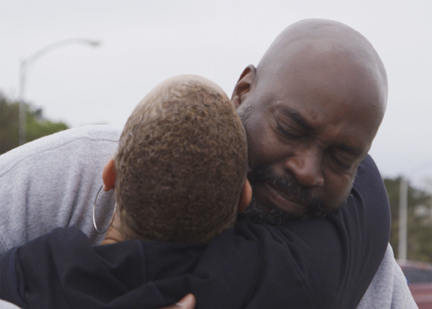Sometimes you get lucky at a film festival. All of the films seen in this round of Tribeca screenings are worthwhile, and the best is, frankly, excellent. It doesn’t always happen that way. So, I make an offering to the gods of cinema for a productive and provocative week of viewing.
The Ride, by French documentarian Stéphanie Gillard, is a gorgeous, impressionistic film of the yearly trek on horseback by a group of Lakota Sioux Indians commemorating the 300-mile trek that their ancestors took from the site of Sitting Bull’s camp to the massacre at Wounded Knee.
Along the route, the initial group of travelers stops at various reservations. There they pick up supplies, swap stories, sing songs, and teach lessons to the younger folks as well as to another group that joins them on their trek. Occasionally they have to take a different route because some of the landowners, who are not American Indian, don’t want them to cross their land. It is learned that 100 years ago the Federal government declared that half of the acreage of the reservation would be leased to non-Natives. One of the riders says that it’s flat-out theft and then pauses for a minute, spits out some tobacco, before sardonically stating, “But that’s history.” Mostly, though, what we see is community, people supporting each other, joking, gambling, and remembering their past.
The Charro of Toluquilla is a fascinating, funny, and poignant documentary, a portrait of Jaime Garcia, a modern Mexican singing cowboy, or charro, who happens to also be HIV. According to the press notes, a charro is “a powerful symbol of Mexican machismo and masculinity, embodying traits of honor, virtue and valor.” Currently, a charro essentially performs feats of equestrian daring, and in this film, old-school machismo values clash with modern society.
Jaime fancies himself a lady’s man, singing in restaurants and picking up girls while maintaining a relationship, though not a marriage, with Rocio, the mother of his adorable daughter, Analia. He clearly adores both, but he’s not the most attentive partner or parent. He seems slightly more enamored of his horse, Paloma. Jaime is charming, seemingly honest, and certainly enjoyable company. Eventually, he chafes under demands and Rocio’s intense religious faith. He leaves her and her daughter for hours at the stable and rides off into the mountains, not returning until late in the evening, and at one point he allows his young daughter to pick up and brandish his gun until she points it at him. The reason he owns one is “because he’s a man.” And here is the crux of Jaime’s character: he is a sensitive soul attempting to live up to an impossible image. José Villalobos Romero directs with a wry, amused sense of distance that deepens to a sense of sympathy and ultimately allows Jaime a moment of triumph. The last shot, a defiant evening ride, is just wonderful.
Junction 48 mixes the early 1990’s “’hood genre” with the current Palestinian-Israeli conflict and does so with style, panache, and verve. The film stars Palestinian hip-hop artist Tamer Nafar as Kareem. He lives in Lod (also known as Lyd), comes from a musical family, and has a girlfriend, who also sings, and a strong group of friends. But the Man, i.e., Israel, is keeping him down. Kareem and his buddies let their frustration out through their musical group. Their lyrics are political, but the Jewish club patron at a gig don’t seem to care since the music is bangin’.
Eventually, conflicts ensue: one of Kareem’s friend’s home is in danger of being demolished to make room for a “Museum of Coexistence,” and there’s the local drug dealer to contend with. When Kareem features his girlfriend on a hip-hop track promoting peace and harmony, her cousins nix the idea of her performing live since it would dishonor them. Frankly, this is the sweetest film you are likely to find about the Palestinian-Israeli conflict even if most of the Israelis here come off as cartoon villains. It is well acted and smoothly directed, and the music is, indeed, bangin’.
The Return, a timely documentary, chronicles the trials and tribulations of a pair of black men released from a decade or more in prison due to the repeal of California’s three-strikes law. That legislation made it mandatory that a third conviction of a crime, even if non-violent, would lead to a minimum sentence of 25 years. The law was repealed when the Supreme Court ruled that prisons, now subject to tremendous overcrowding due to the law, could be deemed “cruel and unusual punishment.”
The film focuses on Kenneth Anderson, convicted of stealing a car radio, and Bilal Kevin Chatman, convicted of selling $200 worth of drugs to an undercover agent. Both were sentenced to life in prison. The film also highlights the work of Mike Romano, who runs the Three Strikes Project, which helps these men transition from prison life to freedom.
This is a heartbreaking study of a terrible law that overwhelmingly fell on the necks of “the poor, the mentally ill, and the addicted” according to Romano. Anderson has a difficult time reconnecting with his family, who is thrilled to have him back, but he can’t seem to fit into their lives and is having trouble holding down jobs. Bilal, a genial, driven, positive-thinking go-getter has a better time of it, but viewers can’t help but think of the lost potential to society. This man has spent his prime years in jail when he could have made a positive difference in the world. When directors Kelly Duane de la Vega and Katie Galloway simply focus on their subjects and their travails, they hit gold.



















Leave A Comment